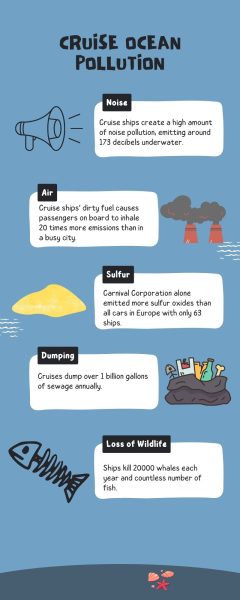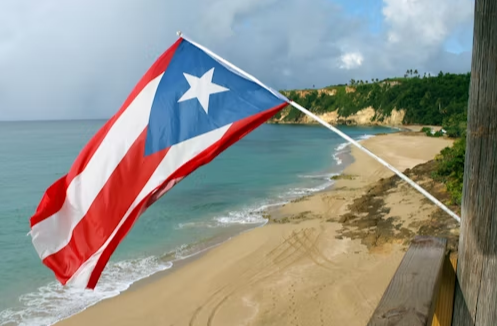From swimming in the Caribbean to exploring the Mediterranean, cruise ships have been a core aspect of millions of tourists’ vacations. Travelers view cruise vacations as enjoyable trips to reach their main destinations. However, cruise companies are not the fun, carefree travel options that their ships make them out to be. Every trip to the Bahamas these companies organize is carefully designed to make as high of a profit as possible, no matter the consequences.
Cruise lines were originally not designed as entertaining travel experiences, instead being the only form of cross-ocean travel. However, with the invention of the airplane cruises were forced to switch course and began to advertise as a luxurious form of travel. This change in advertisement continued until recently. Modern cruises are now pitched as once-in-a-lifetime experiences.
Unfortunately, most travelers on cruise lines will not experience those awe-inspiring moments the companies advertise as cruise lines are usually filled to the brim with passengers and potential viral outbreaks.
The large majority of cruise ships will not depart towards their destinations until every seat has been accounted for. This leads to packed waterparks and other entertainment zones which causes the relaxing trip consumers’ picture to be flooded by crowds of strangers.
Not only do passengers feel cramped while on vacation, they are often unable to hear themselves think as cruise lines generate the same noise as that of a rock concert, according to The Guardian. However, the mundane aspect of these clusters of passengers is not the largest concern, as they tend to ignite viral outbreaks throughout the ship.

Moreover, cruise trips are not environmentally friendly. One cruise liner produces the same amount of sulfur oxides as 4.6 million cars, according to Transport Environment . Not only does their dirty fuel emit harmful emissions, cruise companies have been fined numerous times for dumping waste into the ocean.
Cruise lines are notorious for being epicenters of disease. From COVID-19 to Norovirus, there have been numerous instances of cruises returning with a majority of their customers ill. Norovirus is especially problematic in cruise lines as most vessels do not allow people to room alone yet only design one restroom per room. This combined with the symptoms of Norovirus leads to groups of people being unable to relieve themselves as all the bathrooms nearby are occupied.
Not only are cruises petri dishes for noise and illnesses, but even when passengers manage to tolerate their time on the vessel, their must-see destination has a chance of being canceled. Cruise ships have very loose schedules, as travel points are often canceled due to poor weather or potential danger, meaning that even when tourists manage to tolerate all the issues on board they may still miss their main destination.
Along with poor vacations, cruise companies frequently dwell in the legal gray area of ethics. Although most companies are US based, almost all vessels fly the flag of one of their main destinations, known as a flag of convenience. These flags allow the companies to evade US tax laws and minimum wage regulations, which is why the average cabin steward makes $13,800 per year, according to Cruise Hive . With flags of convenience, companies are only obligated to pay 0.25% of their yearly revenue, according to JTC Group.
However, Some believe that cruise companies go beyond the legal gray area as they are often reported for sexual assaults, drugging, armed robberies, and murders.
Over the years many cruise workers have been reported for sexual assaults, most of which involved the victim being drugged at a bar on the vessel. Cruise companies often flood these issues out by denying accusations and shielding suspects, causing most cases to go under the radar.
Due to their limited exits and few ports, cruise ships are also often targeted in armed robberies, so often in fact that the US released an advisory statement as a warning. “Violent crime, such as burglaries, armed robberies, and sexual assaults, occur in both tourist and non-tourist areas. Be vigilant when staying at short-term vacation rental properties where private security companies do not have a presence”, read the report.
Many crimes on board, however, are often unreported as victims are fearful that suspects will throw them overboard. From 2000 to 2020, 386 people fell overboard, both voluntarily and involuntarily, and of those only 25% were rescued, according to a report by the Washington Post.
Even when crimes are reported, many do not reach court because of the flags of inconvenience. According to US law, crimes at sea within a 13 mile range from US land will be investigated by the FBI, allowing professionals to collect any possible evidence of illegal activity.
However, any crimes past that range in international waters are to be investigated by the country whom the vessel is flying the flag of. Due to nations such as the Bahamas and Jamaica not having effective overseas investigation departments, this causes cruise workers to perform the investigation themselves. The lack of professional investigators often leads to these cases never reaching court.
Whether it’s emitting harmful gasses or hiding crimes onboard, cruising often causes more harm than good. Stricter regulations on the industry should be established to prevent the silencing of victims and allow criminals the apprehension of criminals. For now, however, cruises will continue being focal points of disease, pollution and crimes.














































































